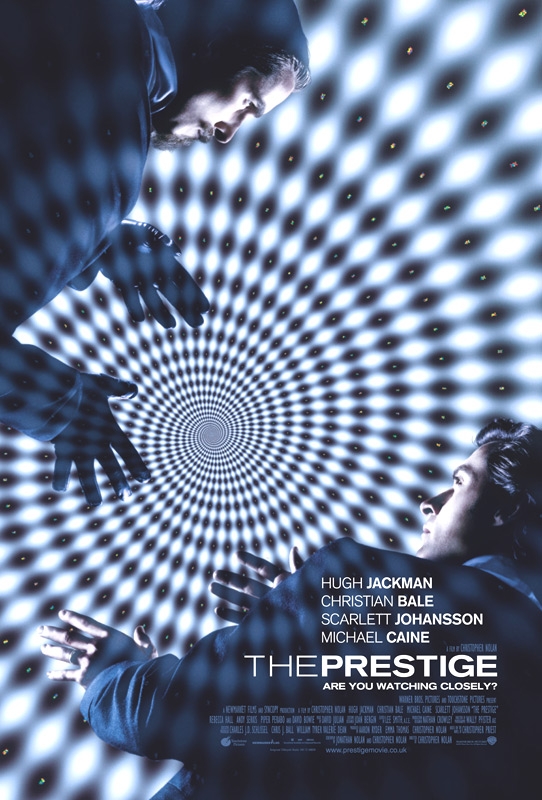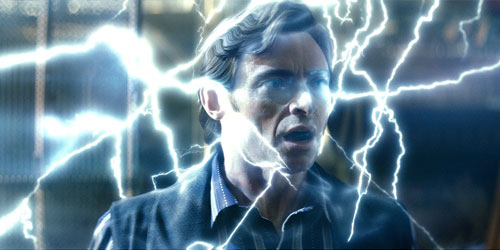January 12, 2007
Enjoyment and the Secret

Christopher Nolan's The Prestige is an enthralling study of doubles, doubling and duplicity. Its twinned themes are obsession and the Secret: the Secret as objet-a, that which inspires, but which can never satisfy, obsession.
The Prestige is set in the 1890s, when a gaslit age was being awakened to the power of electricity, and its sensibility belongs to an older era of simulacra; one in which, instead of seeking to unmask illusion, audiences succumbed to its power. The film is about stage magic, and its most insistent refrain is 'are you watching closely?' But in the theatre, it was not possible to watch too closely; moreover, as The Prestige reminds us, the audience of magic willingly submits to misdirection in order to be beguiled.
The 1890s was perhaps the most Gothic decade ever: Dracula, The Picture of Dorian Gray and The Time Machine, not to mention Heart of Darkness and The Interpretation of Dreams, were all written between 1890 and 1899. The film has a lovingly cultivated whiff of fin-de-siecle Wellsian Scientific Romance, with Nikola Tesla (David Bowie, ) the key - in more than one sense - to the plot's intrigues. As an examination of duplicity and the willing subordination to illusion, The Prestige is of course about the power of film and fiction to cast spells. Its own captivation depends upon keeping the question of its own generic status open: are we watching a simulation of 1890s narrative realism or have we - as some IMDB commenters complained without irony - been 'conned' into watching an SF film? The film's final irony concerns the fact that, to function as magic, genuine science must appear as an illusion.
The film takes its title from Victorian stage magical terminology, which divided the trick into three stages: the Pledge, in which an ordinary object is presented, the Turn, in which the object disappears or is transformed, and the Prestige, in which the object returns. Behind the empirical object, however, is the sublime object which makes the Prestige possible: the Secret. The Secret is the stage magician's holy grail - what the two rival magicians Borden (Christian Bale) and Angier (Hugh Jackman) are prepared to steal, kill and destroy themselves in order to possess. Professional betterment and wealth may be the ostensible goals driving Borden and Angier, but it is the sublime allure of the Secret which draws them to their doom.
The film warns us repeatedly that the Secret cannot be possessed. The Secret is Nothing, and enjoyment is inherently tantalising. Before we are privy to it, the Secret is only a mysterous nullity, a black box. But, once it is revealed, the Secret immediately devolves into mere facts, empirical happenstance, deprived of that 'extra something' which was its sublime substance. Concealment fascinates; revelation disappoints. Naturally, this holds for the Secrets of fiction and the film - the maguffins and moonstones that are the object-causes of the reader's and viewer's desire - as much as for the Secrets of magic.
As soon as the Secret is exposed, the trick no longer interests the audience. Yet the magician who has designed the trick does not possess the Secret; he only knows the facts. What makes him an artist (the conjuror of an illusion) as well as an artisan (the creator of machines) is his capacity for convening/ concealing the Secret for/ from an Other.
The Secret exists in the reciprocal interplay of the audience's enjoyment and that of the illusionist. The audience's enjoyment derives from its state of puzzlement together with its awareness that there is a subject who knows; in order to preserve this enjoyment, the audience must not acquire knowledge for itself. The illusionist's enjoyment, as Angier makes clear in his final speech, resides in his seeing the entranced face of the Other - in other words, it consists in his enjoyment of the other's enjoyment, and to preserve his enjoyment, the illustionist cannot disclose his Secret. While the Secret is kept, Angier tells Borden, it transforms the universe from a grubby charnel house governed by logical and factual enchainments into a unpredictable place glowing with mystery and wonder. In this sense, the Secret is a miracle, the means by which the universe becomes more than what it is ...
